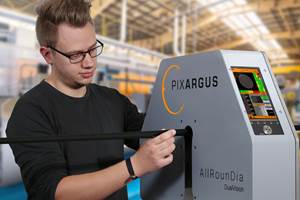Portable CMM Helps Thermoformer Hold Tight Tolerances in Large Parts
Thermoform Plastics Inc. (TPI) in St Paul, Minn., believes it has found a better way to guarantee dimensional accuracy in large parts with complex shapes.
Thermoform Plastics Inc. (TPI) in St Paul, Minn., believes it has found a better way to guarantee dimensional accuracy in large parts with complex shapes. The company specializes in rotary forming of large, multi-dimensional parts for automotive, specialty-vehicle, marine, and other markets. A sound method for ensuring dimensional accuracy is imperative in most of the programs TPI pursues. However, most traditional methods of verifying part dimensions are bulky, expensive, time-consuming, and often unreliable. Instead, TPI has adopted a portable coordinate-measuring machine called the Control Station Pro (CSP), supplied by Faro Industries Inc. in Lake Mary, Fla. TPI uses five CSPs to validate tools and parts, check CAD drawings, and reverse engineer prototypes.
By using CSP, TPI has been able to win new customers and design more complex parts than before, according to John Zeidlick-Zimney, TPI corporate quality-assurance manager. He cites examples like a burial vault with multi-radii surfaces, the skin of a fire truck comprising more than a dozen parts, and a recreational boat deck that incorporates intricate mounts and cutouts.
Big parts are difficult
In the past, TPI verified dimensional accuracy in parts like these with mechanical rigs of gauges, calipers, rules, clamps, tapes, etc. It was a low-cost way to measure sample parts for fit and finish (e.g., hole or cutout position). However, it consumed a great deal of time, notes Zeidlick-Zimney, since the rigs required constant repetitive manual operations and resetting of parameters. He adds that this approach is subject to error drift and inaccuracy.
Another option would be traditional coordinate measuring machines, or CMMs, but they are typically mounted on a fixed-bed and occupy considerable space. They are also costly.
In response, TPI shifted to Faro’s CSP system as a more affordable and versatile method for measuring dimensional accuracy in formed parts. The Faro system can be used in the laboratory or deployed on the production floor by using a portable tripod. For about one-tenth the cost of a traditional CMM, Faro’s $39,900 package includes portable hardware and recently upgraded computer software.
CSP is based on a six-axis, articulated arm with a probe on the end that can be manually manipulated to lightly touch points on a part surface. At each touch, the computer records 3D coordinates to ±10 mils. (TPI’s part tolerances are ±30 to 60 mils.) The arm’s reach covers the full gamut of parts made by TPI: 10 x 22 ft x 58-in. draw. An optional port allows the attachment of scanners, sensors and other electronic probes to the arm.
First-article checking
The system has proved important in validating dimensions of initial parts from a new tool. TPI now outsources most of its tool building, which makes capability studies on initial parts more critical than ever. Zeidlick-Zimney estimates that capability studies that once took five shifts can now be done in one shift or less.
Another CSP capability is cross checking the dimensions of tools and parts against original CAD drawings. As the probe touches points on the part or tool, the CAM2 software draws an image on a PC screen in real time, so the inspection team can immediately compare measured features with those on the original CAD drawing.
A third benefit is the ability to enter data into existing SPC software. CSP can be programmed to create a library of measured data based on periodic checks of part or tool dimensions. That helps TPI generate validation data for easy transfer to customers who require it.
Finally, CSP gives TPI a low-cost method for “reverse engineering.” The system can be used to record 3D coordinates of a clay model and translate them directly into a CAD file.
Related Content
Measuring Technology Specialist Pixargus Acquired by CiTex Group
A global player in optical inline quality control, Pixargus is intensifying presence in U.S. & Asia under CiTex umbrella.
Read MoreUpgrade to Accelerated Artificial and Natural Weathering Testing
NPE 2024: Atlas’ S³T system is designed for the company’s Weather-Ometer Ci4400 and Ci5000 instruments
Read MoreInline Measurement Adds Module for Inspection of High-Gloss Vehicle Trims
Pixargus’ Shiny Detection module casts a pattern of structured light onto the high-gloss surfaces of the profiles to be inspected.
Read MoreUpdated Interactive Tool for Predicting Multilayer Film Performance
NPE 2024: NOVA Chemicals presents the latest enhancements to its Bonfire Multilayer Property Predictor and new Syndigo rPE portfolio
Read MoreRead Next
Lead the Conversation, Change the Conversation
Coverage of single-use plastics can be both misleading and demoralizing. Here are 10 tips for changing the perception of the plastics industry at your company and in your community.
Read MoreMaking the Circular Economy a Reality
Driven by brand owner demands and new worldwide legislation, the entire supply chain is working toward the shift to circularity, with some evidence the circular economy has already begun.
Read More










